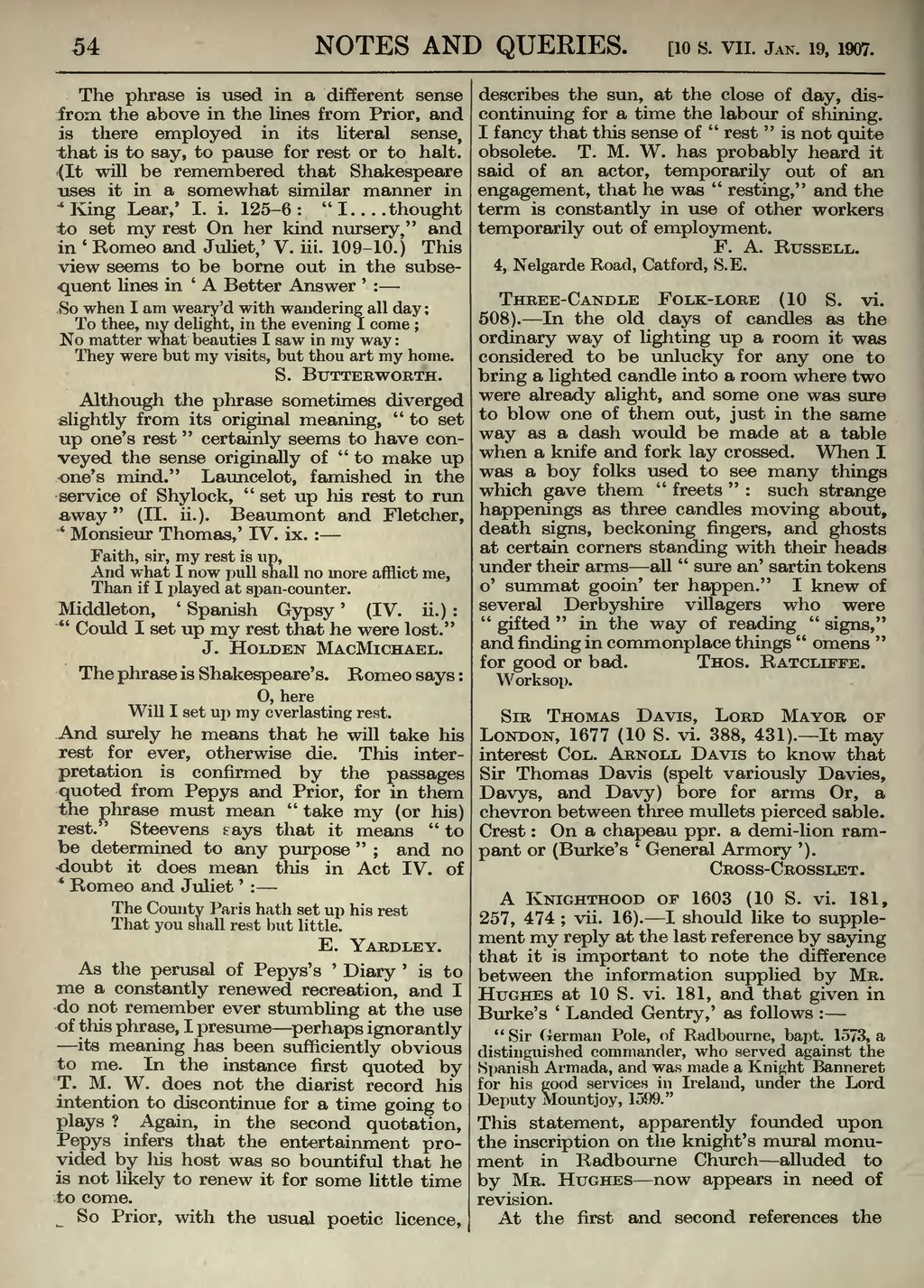54
NOTES AND QUERIES. [io s. VIL JAN. 19, 1907.
The phrase is used in a different sense
from the above in the lines from Prior, and
is there employed in its literal sense,
that is to say, to pause for rest or to halt.
(It will be remembered that Shakespeare
uses it in a somewhat similar manner in
'King Lear,' I. i. 125-6: "I thought
to set my rest On her kind nursery," and in ' Romeo and Juliet,' V. iii. 109-10.) This view seems to be borne out in the subse- quent lines in ' A Better Answer ' :
.So when I am weary'd with wandering all day ;
To thee, my delight, in the evening I come ; No matter what beauties I saw in my way :
They were but my visits, but thou art my home.
S. BUTTERWORTH.
Although the phrase sometimes diverged slightly from its original meaning, " to set up one's rest " certainly seems to have con- veyed the sense originally of "to make up one's mind." Launcelot, famished in the service of Shylock, " set up his rest to run away " (II. ii.). Beaumont and Fletcher, ' Monsieur Thomas,' IV. ix. :
Faith, sir, my rest is up,
And what I now pull shall no more afflict me,
Than if I played at span-counter. Middleton, ' Spanish Gypsy ' (IV. ii.) : " Could I set up my rest that he were lost."
J. HOLDEN MACMlCHAEL.
The phrase is Shakespeare's. Romeo says :
O, here
Will I set up my everlasting rest. .And surely he means that he will take his rest for ever, otherwise die. This inter- pretation is confirmed by the passages quoted from Pepys and Prior, for in them the phrase must mean " take my (or his) rest." Steevens says that it means " to be determined to any purpose " ; and no doubt it does mean this in Act IV. of
- Romeo and Juliet ' :
The County Paris hath set up his rest
That you shall rest but little.
E. YARD LEY.
As the perusal of Pepys' s ' Diary ' is to me a constantly renewed recreation, and I do not remember ever stumbling at the use of this phrase, I presume perhaps ignorantly its meaning has been sufficiently obvious to me. In the instance first quoted by T. M. W. does not the diarist record his intention to discontinue for a time going to plays ? Again, in the second quotation, Pepys infers that the entertainment pro- vided by his host was so bountiful that he is not likely to renew it for some little time to come.
So Prior, with the usual poetic licence,
describes the sun, at the close of day, dis-
continuing for a time the labour of shining.
I fancy that this sense of " rest " is not quite
obsolete. T. M. W. has probably heard it
said of an actor, temporarily out of an
engagement, that he was " resting," and the
term is constantly in use of other workers
temporarily out of employment.
F. A. RUSSELL. 4, Nelgarde Road, Catford, S.E.
THREE-CANDLE FOLK-LORE (10 S. vi. 508). In the old days of candles as the ordinary way of lighting up a room it was considered to be unlucky for any one to bring a lighted candle into a room where two were already alight, and some one was sure to blow one of them out, just in the same way as a dash would be made at a table when a knife and fork lay crossed. When I was a boy folks used to see many things which gave them " freets " : such strange happenings as three candles moving about, death signs, beckoning fingers, and ghosts at certain corners standing with their heads under their arms all " sure an' sartin tokens o' summat gooin' ter happen." I knew of several Derbyshire villagers who were " gifted " in the way of reading " signs," and finding in commonplace things " omens " for good or bad. THOS. RATCLIFFE.
Worksop.
SIR THOMAS DAVIS, LORD MAYOR or LONDON, 1677 (10 S. vi. 388, 431). It may interest COL. ARNOLL DAVIS to know that Sir Thomas Davis (spelt variously Davies, Davys, and Davy) bore for arms Or, a chevron between three mullets pierced sable. Crest : On a chapeau ppr. a demi-lion ram- pant or (Burke's ' General Armory ').
CROSS-CROSSLET.
A KNIGHTHOOD OF 1603 (10 S. vi. 181, 257, 474 ; vii. 16). I should like to supple- ment my reply at the last reference by saying that it is important to note the difference between the information supplied by MR. HUGHES at 10 S. vi. 181, and that given in Burke's ' Landed Gentry,' as follows :
" Sir German Pole, of Radbourne, bapt. 1573, a distinguished commander, who served against the Spanish Armada, and was made a Knight Banneret for his good services in Ireland, under the Lord Deputy Mountjoy, 1599."
This statement, apparently founded upon the inscription on the knight's mural monu- ment in Radbourne Church alluded to by MR. HUGHES now appears in need of revision.
At the first and second references the
